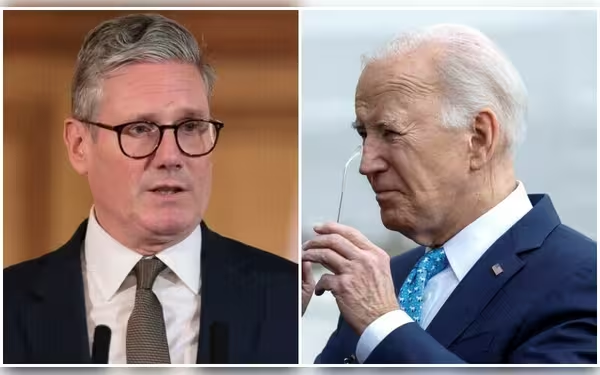Sunday, November 17, 2024 12:24 AM
Biden And Starmer Postpone Ukraine Missile Discussions Until UNGA
- Biden and Starmer defer missile discussions to UNGA session.
- Concerns over escalating conflict with Russia influence decisions.
- Prisoner swap between Russia and Ukraine marks humanitarian progress.
 Image Credits: dawn
Image Credits: dawnBiden and Starmer postpone missile discussions for Ukraine until UNGA amid rising tensions with Russia.
In a significant development regarding the ongoing conflict in Ukraine, British Prime Minister Keir Starmer and US President Joe Biden have decided to postpone discussions about allowing Ukraine to use long-range Western-supplied missiles against Russia. This decision comes amid rising tensions and threats from Moscow, which has warned that such actions could escalate into a war involving NATO. The leaders' discussions took place at the White House, where they addressed various strategic issues but did not finalize any specific military capabilities.
Before their meeting, it was anticipated that Starmer would advocate for the provision of British Storm Shadow missiles to Ukraine, enabling deeper strikes into Russian territory. However, both leaders agreed to revisit this topic during the upcoming United Nations General Assembly session in New York, where they plan to engage with a broader group of international representatives.
During their discussions, President Biden downplayed a stern warning from Russian President Vladimir Putin, who stated that allowing Ukraine to fire these missiles would signify that the West is “at war” with Russia. Biden appears hesitant to meet Ukraine's persistent requests for long-range ATACMS missiles, as US officials believe that such weapons would have a limited impact on the current battlefield situation. Additionally, there are concerns about depleting US military stockpiles.
The conversation also touched upon the ongoing conflict in Gaza, with the UK recently halting arms deliveries to Israel due to worries about potential violations of international humanitarian law. Both leaders reaffirmed their strong commitment to Israel while emphasizing the urgent need for a ceasefire and greater protection for civilians in Gaza.
Ukrainian President Volodymyr Zelensky has been vocal in urging Western allies to increase their support for Ukraine. He expressed frustration, stating that the West seems “afraid” to assist Ukraine in intercepting incoming missiles, unlike the support provided to Israel.
In a related development, a prisoner swap took place between Russia and Ukraine, with each side exchanging 103 prisoners of war. This exchange was facilitated by the United Arab Emirates and marks a significant step in the ongoing humanitarian efforts amid the conflict. President Zelensky confirmed the return of Ukrainian soldiers, including privates, sergeants, and officers, who had been held captive since the early days of the war.
As the situation continues to evolve, the international community remains watchful. The decisions made by leaders like Biden and Starmer will undoubtedly shape the future of the conflict in Ukraine and the broader geopolitical landscape. The need for diplomatic solutions and humanitarian considerations remains paramount as both nations navigate these complex challenges.













